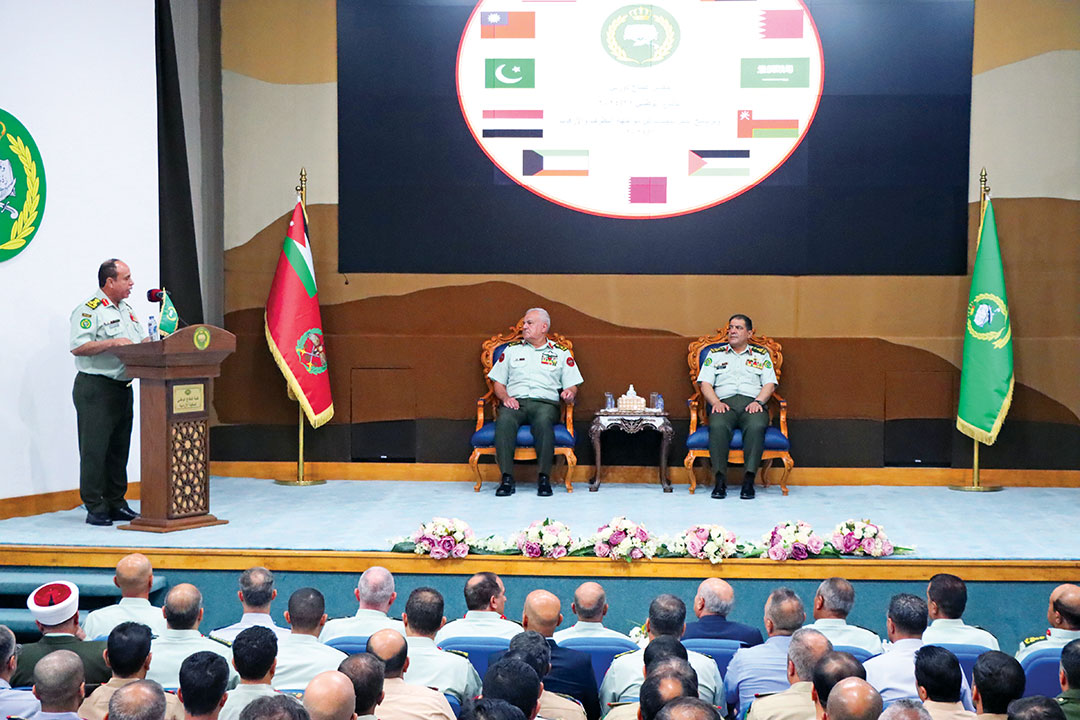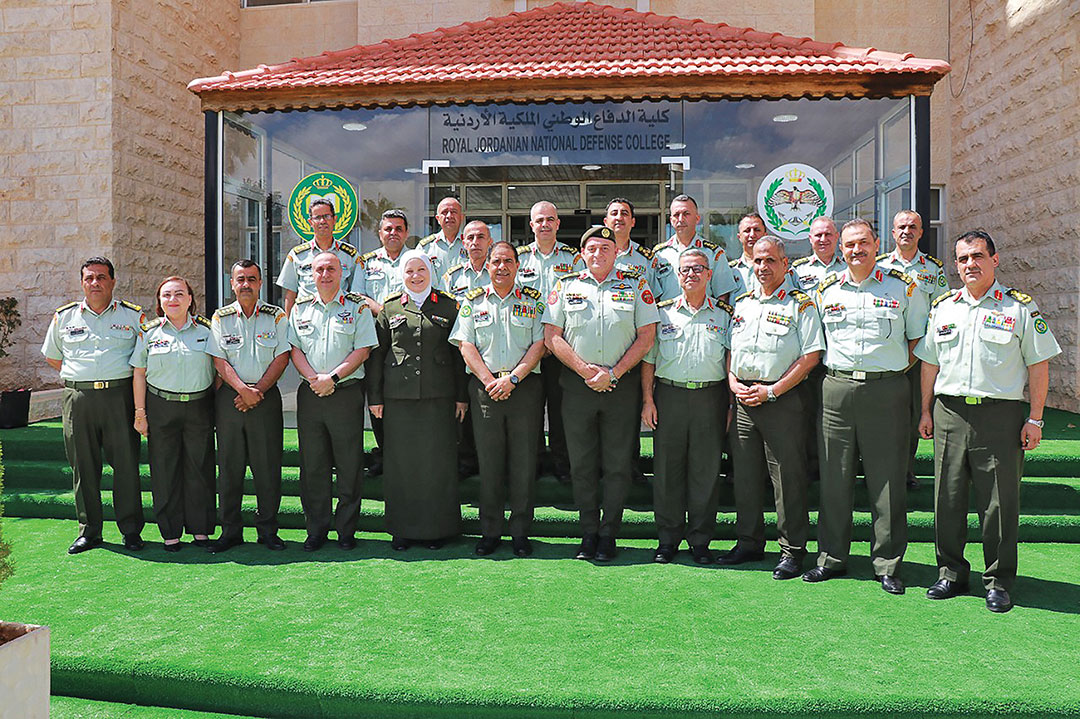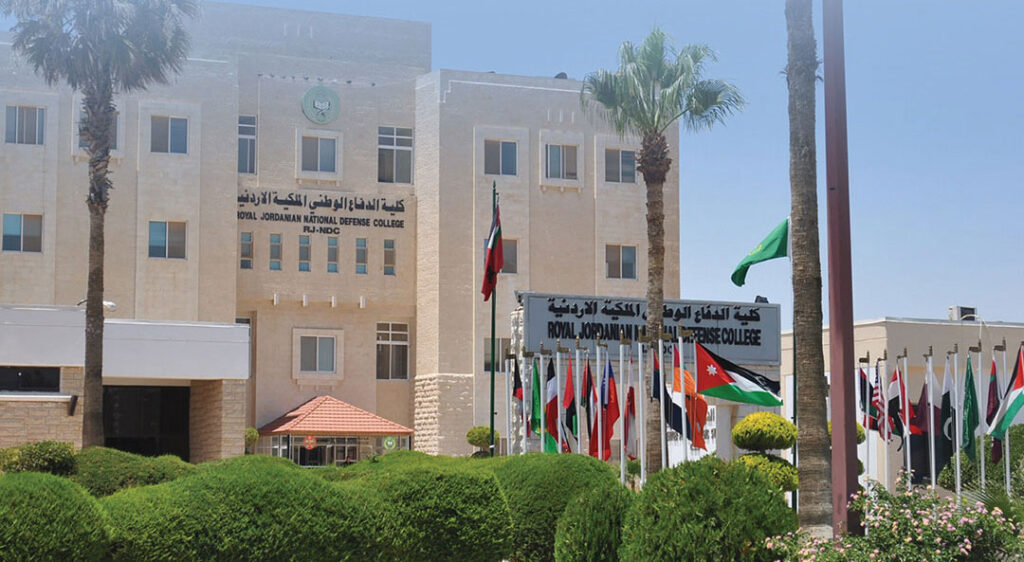UNIPATH STAFF
To keep pace with regional threats, Jordan focuses on developing security and defense-related strategies. The Jordan Armed Forces is considered one of the militaries that honed sophisticated capabilities and accumulated expertise. It is from this very experience, which Jordan is keen to share with its brothers and friends for the sake of a stable and secure region, that the Royal Jordanian National Defense College (RJNDC) emerged to become an edifice that prepares leaders of the future. Unipath met with Brig. Gen. Azzam Al-Rawahneh, commander of the National Defense College where, as is his custom, he welcomed Unipath with hospitality and talked about the college’s achievements and his vision to advance it.
Unipath: What is the mission of the Royal Jordanian National Defense College?
Brig. Gen. Azzam: First, I would like to talk about the origin of the college. The Jordanian Armed Forces are a component of the Jordanian state, and as a dynamic force they evolve as regional security challenges evolved. For this reason, the college from the outset was founded with the strategic outlook of the Hashemite leadership. Training and producing leaders who are capable of leading and complementing the state and of addressing its challenges necessarily required the establishment of a college that could achieve this. We therefore began with the establishment of the Royal War College, which was principally focused on strategic military planning. This lasted until 2002, when the strategic vision of Hashemite political and military leadership necessitated a shift in the Armed Forces toward an advanced level that would achieve harmony and integration of the state’s civil and military institutions. Its primary objective was to train leaders capable of managing the state at the military and civilian levels and to achieve the goals and interests of the state in a way that provides qualified human resources and skills capable of moving the military establishment and the other state institutions forward, in parallel, to confront diverse emerging threats. From there, a move toward the concept of the Royal Jordanian National Defense College took place. The notion of comprehensive defense called for expertise within state institutions to achieve experience sharing. With that, the National Defense College was launched in 2003. The RJNDC started with joint courses for defense and wartime training. The college has continued down this path and has prepared 22 regiments of commanders. The work of the college is not limited to the preparation of leaders for the Jordanian side, but also involves preparing leaders from countries across the region and around the world.

Unipath: Most conventional wartime strategies have changed. How does the curriculum cover hybrid and fifth-generation warfare?
Brig. Gen. Azzam: The Defense College stays up to date with major trends. The first way we do this is through ongoing relationships with our friends in Europe and the United States. We also keep abreast of new developments in the operational environment in particular, and through scholarship and research. Additionally, we have a committee for developing and updating curriculum so that we can keep pace with the rest of the world. From here, I assure you that the precepts of operations and leadership training include modern warfare concepts in accordance with the highest international standards, whether that is hybrid or cyberwarfare, or fourth- and fifth-generation warfare. We are therefore very keen that we don’t fall behind, even for a moment, in any of our research in this field since we are considered a role model in this field for the region.
Unipath: What is your philosophy on building the capabilities of young people to be the standard-bearers of the future?
Brig. Gen. Azzam: I don’t consider my philosophy to be my own personal philosophy; rather, it is derived from the philosophy of the state in general and from the philosophy of the Hashemite leadership, which was primarily based on the idea of improving human capabilities to improve the state. During the past 20 years, the philosophy of the Hashemite leadership has been to focus on preparing and building young leaders who are capable of understanding the requirements of the times and of dealing with modern technologies. This came about under the guidance of the commander-in-chief and has been spearheaded by His Highness the Crown Prince Hussein ibn Abdullah, a young man possessing vision and a robust energy for work. I believe that investment in the future is an investment in young leaders in both the civil and military dimensions. This is the prevailing approach in the Hashemite Kingdom of Jordan, and the RJNDC is one of our tools for implementing this philosophy. We are committed to following this approach and focusing on developments in military and strategic studies, whether that relates to modern wars and their patterns, the environment of emerging threats and hardware, or to the tools used in the administration of the state. I firmly believe that the modern state cannot be managed by the tools of the past.
Unipath: Who are your students and what positions do they occupy in the Armed Forces?
Brig. Gen. Azzam: In past years, our students have been at the more advanced ranks of brigadier general and above. As for the civilian sector, there are clear conditions for the level of qualification and the level of certificates they must possess before joining the college and in their degree of classification and job grade in the government service. Militarily, we used to begin with the rank of brigadier general, but in keeping with the philosophy of investing in our young people, we now have students with the rank of colonel and lieutenant colonel in the Jordan Armed Forces to build and train young leaders who will be capable in the future of assuming leadership positions at the operational and strategic level so we are better suited to building a generation capable of decision-making and strategic planning.
Unipath: What are your plans for developing the National Defense College?
Brig. Gen. Azzam: Our vision is derived from the leaders who preceded me and who set solid foundations on which we can build. From there we must take steps consistent with the requirements of the times and with the existing evolution of military theories and state interests. This institution has a wealth of experience providing capable leadership to the Armed Forces and government bodies. My vision is based on two main approaches. The first is the need to build bridges of cooperation and communication with all major world universities similar to the RJNDC — those that specialize in defense, strategic theory and the doctrines of modern warfare — to transition at the regional and international levels through the exchange of experiences and lectures and by holding seminars and joint studies. In doing so, we will achieve very important results at both levels. First, we will serve Jordan by expanding the intellectual faculties of our students and building leaders that are more informed about the world. Second, we will export Jordan’s philosophy and strategic vision to the world so that we can promote and build international partnerships that serve the interests of all. As for the second half of our vision, we must promote the substantive and technical aspect of technology. This is critical to the development of the college, its affiliates and students. Greater emphasis should also be placed on practical training and workshops that entrench concepts and enable us to help the state address crises, especially since we are in an environment immersed in crises.

Unipath: Do you have courses that address modern technologies like drones and cyber defense?
Brig. Gen. Azzam: When we talk about an academic institution that prepares future leaders, we must have tools that contribute to the development of the academic side. By this, I mean developing the institution’s capabilities and infrastructure to provide all the technologies that help students conduct research and access required information. And yes, all leaders must be familiar with cybersecurity and with cyber operations and their requirements because they have become a key part of the defense system of any country. When we talk about defense tools, cybersecurity is one of the main pillars because cyberattacks threaten information security and could threaten the lives of citizens if networks are hacked. We also use drones in practical exercises that simulate reality. This gives students a big picture understanding of how to face these modern threats. I believe we must think seriously about how to transition to an advanced technical level that can overcome crises and enhance the efficiency and capability of decision-makers. I stress that any statesman or strategist must be familiar with all modern technologies and the ways in which terror groups and state sponsors of terrorism exploit them.
Unipath: You have a relationship with the American National Defense University and the Center for Middle Eastern Studies. Do you also have relationships with military academies in neighboring countries and other countries of the world?
Brig. Gen. Azzam: The Kingdom of Jordan is a well-established nation in the region and enjoys good relations with brotherly countries and countries of the world. We enjoy regional and international respect, and these relationships have resulted in cooperation at all levels, including academic and military. If we are talking about the U.S. National Defense University, this is an established institution that enjoys a prestigious worldwide reputation and produces leaders at all levels. This is in addition to the tremendous potential and accumulated experience available, which we are keen to build on and develop through relations with international academies. At the same time, we have a network of relationships with similar institutes through cooperation with our brothers in the region from the Gulf states, Egypt, Sudan and Iraq, including student exchanges. Similarly, we have helped many countries in the region establish similar colleges and I think we have a good balance of relations with our friends in the West as we have relations with most military academies. This network of relationships is a key part of our development strategy. At the same time, building a common understanding between these institutions is in everyone’s interest.
Unipath: What countries have students and professors at the college?
Brig. Gen. Azzam: We have students from the United States, Pakistan, Taiwan, Germany, Saudi Arabia, Bahrain, the United Arab Emirates, Egypt, Kuwait, Sudan and Lebanon. As for professors, there are no foreign professors in our faculty, but we do invite professors and researchers to join us as visiting guests, whether from the U.S. or European side, or from NATO or Arab countries. We have regular visits from the ambassadors of friendly and brotherly nations present in Jordan. We also have relationships with established universities, drawing on their expertise, such as Harvard University and the Geneva Center for Strategic Studies, where we offer annual joint courses in strategic leadership. So, training and development are not limited to Jordanian expertise; instead, we seek to benefit from the experiences of our friends and brothers. Also, we have some retired professors and officers working in military academies in the Gulf countries. Most of the military academies in that region were built with Jordanian expertise, and our fingerprints are still present in their achievements.
Unipath: How does an affiliation with the RJNDC benefit other national defense colleges?
Brig. Gen. Azzam: The college’s history and vision, along with the direct interest of His Majesty the Commander-in-Chief — His Majesty regularly visits the RJNDC and closely follows its development and curriculum — has provided all state institutions with an interest in assisting its development and sets it apart at the regional and international level, making it capable of being an active and positive partner for finding solutions related to the security and stability of the region and the world. We are a magnet within the region, especially when speaking from a strategic and operational perspective. Diversity is necessary for leadership training, and even though we have a national defense college that boasts all the components of defense colleges in developed nations, we still send students to Europe, the United States and Pakistan, among other countries. At the RJNDC, we also have professors who hold degrees from several international academies and colleges. This diversity is a source of excellence and strength. Additionally, our accumulated experience, high degree of credibility, continued development, and the moderate climate and geographical nature of Jordan aids in the reception of visitors, especially since Jordanian society is a tolerant one that welcomes guests. The mutual trust between us and our friends along with the leaders who have graduated from our college over the years has proven that those who graduate from Jordanian institutes and the defense college are highly skilled and qualified to carry out their leadership duties. We have different standards. We build on our historical capital and experience and on our high credibility when training leaders. This is our capital and reputation, and with that there can be no compromise.

